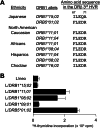Updates on genetics in systemic sclerosis
- PMID: 34130729
- PMCID: PMC8204536
- DOI: 10.1186/s41232-021-00167-6
Updates on genetics in systemic sclerosis
Abstract
Systemic sclerosis (SSc) is a complex disease, in which an interaction of genetic and environmental factors plays an important role in its development and pathogenesis. A number of genetic studies, including candidate gene analysis and genome-wide association study, have found that the associated genetic variants are mainly localized in noncoding regions in the expression quantitative trait locus and influence corresponding gene expression. The gene variants identified as a risk for SSc susceptibility include those associated with innate immunity, adaptive immune response, and cell death, while there are only few SSc-associated genes involved in the fibrotic process or vascular homeostasis. Human leukocyte antigen class II genes are associated with SSc-related autoantibodies rather than SSc itself. Since the pathways between the associated genotype and phenotype are still poorly understood, further investigations using multi-omics technologies are necessary to characterize the complex molecular architecture of SSc, identify biomarkers useful to predict future outcomes and treatment responses, and discover effective drug targets.
Conflict of interest statement
The authors declare that they have no competing interests.
Figures

References
-
- Varga J, Trojanowska M, Kuwana M. Pathogenesis of systemic sclerosis: recent insights of molecular and cellular mechanisms and therapeutic opportunities. J Scleroderma Relat Disord. 2017;2(3):137–152. doi: 10.5301/jsrd.5000249. - DOI
-
- Kettaneh A, Al Moufti O, Tiev KP, Chayet C, Tolédano C, Fabre B, et al. Occupational exposure to solvents and gender-related risk of systemic sclerosis: a metaanalysis of case-control studies. J Rheumatol. 2007;34(1):97–103. - PubMed
Publication types
LinkOut - more resources
Full Text Sources
Other Literature Sources

